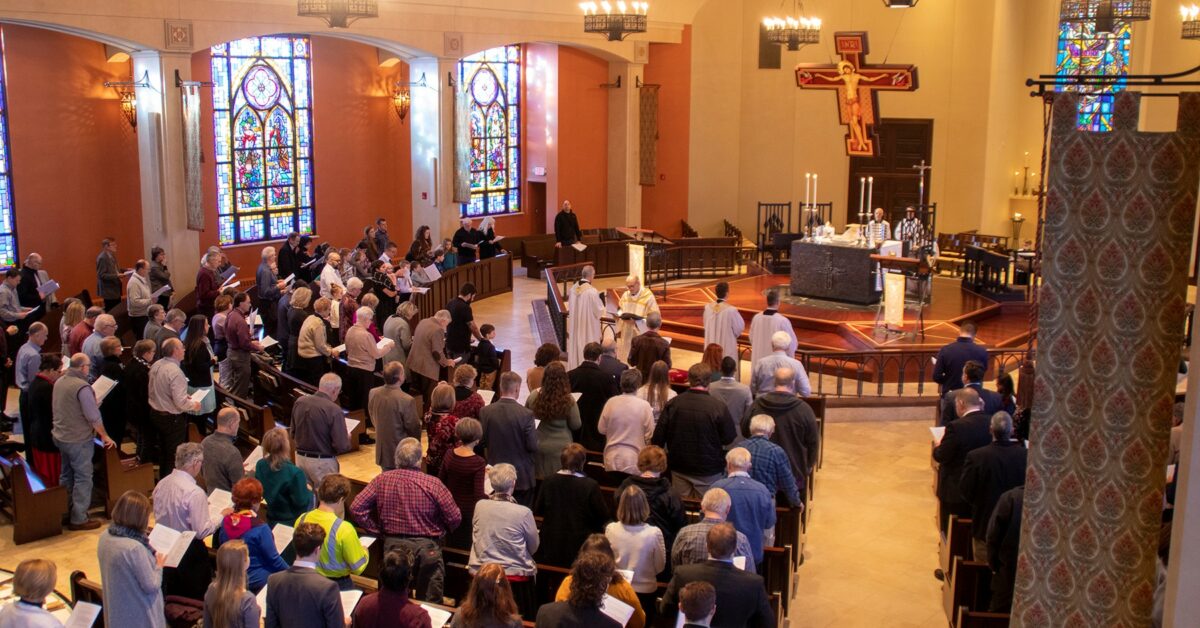A Ritual Journey: The Stage of the Catechumenate
Over the last several weeks we have explored in detail the Rite of Welcome/Rite of Acceptance into the Order of Catechumens. Once the inquirers cross this ritual threshold they enter into a new status in the church. They are now officially catechumens, intentionally committed to exploring the faith of the church and life within the Christian community that will lead to baptism. The catechumenate period, which ideally would last 6 months to a year, allows a much deeper exploration of the gospel and Christian faith than the Stage of Inquiry. It is a holistic immersion in the faith that intersects the catechumens’ lives with the Word of God, worship, prayer, the church’s ministry in the gospel and its service in the world. It explores not only the assembly’s life in faith but Christian life beyond the assembly in the world both near and far. As Ronald Lewinski says in his book An Introduction to the RCIA the catechumenate stage “gives reason to faith and enables [the catechumens] to live by faith in the world” (36). One of the primary agents for facilitating this holistic immersion are the catechumens’ sponsors. They walk with them throughout the process, attending as many catechumenal activities as possible, and serve as partners in reflection on the gospel and the way of Christian life that flows from the gospel.
Reflection is a central aspect of the catechumenate stage. The catechumens’ reflection on the meaning of faith in the gospel and its implications for life begins with listening to the Word. As the Rule of St. Benedict says one should “Listen with the ear of your heart.” This implies an in-depth exploration of the meaning and significance of the Word of God. Hearing the Word and reflection on the Word is the heart of the catechumenate stage. Every gathering of the catechumenate should focus on the Word. Ideally, the weekly lectionary and the church year serve as a focal point for forming the catechumens into the Christian way. This provides a rhythm, grounded in the gospel readings, for reflection on the gospel and faith. This rhythm may include dismissing the catechumens after the service of the Word each Sunday to discuss the readings just heard. Or it may include focusing on the readings, especially through the lens of the gospel, in midweek gatherings. Pastors, catechists, and sponsors facilitate reflection on the meaning of the Word and its significance for the daily life of the community and of the catechumens now immersed in that community.
And the Word cannot be contained just to the Sunday assembly and reflection on it. The Word should permeate the entirety of the assembly’s life: worship, prayer, ministry, teaching, fellowship, service, and mission. The catechumenate stage brings the catechumens into engagement with the Word as it is heard and gives shape to all the varied areas of parish life. This is why, as we noted in a previous post, Diana Macalintal refers to the parish as the curriculum of faith formation. Catechumens should be exposed to the ways in which the Word interpenetrates the entire assembly’s life. This will initiate the catechumens into God’s mission through the congregation. It will allow them to “see” God’s mission in motion beginning in worship but stretching out through the parish’s life in service to one another and in witness to the world.
Like the Word, catechetical teaching permeates the catechumenate stage. It thoroughly introduces the catechumens to a host of catechetical and doctrinal topics. Yet, those topics should be grounded in the Word that the catechumens are hearing from Sunday to Sunday. In other words, the Word in the weekly assembly and permeating congregational life should prompt the kinds of topics taught and reflected upon in catechesis. As Ronald Lewinski says of catechesis, “The object of catechesis is communion with Jesus Christ. Catechesis leads people to enter the mystery of Christ, to encounter him, and to discover themselves and the meaning of their lives in him” (37).
And just as the Word permeates congregational life, so does conversation with God or prayer. The catechumenate stage is a mentorship in prayer for the catechumens. They should be formed toward a life of prayer and taught how to pray. Prayer, perhaps encapsulated in brief rites or devotions, should begin and end each catechumenal gathering. And sponsors ideally will model a vigorous life of prayer with their catechumens. Developing fellowship centered in prayer and the Word also encourages regularly eating a meal together whenever the catechumens gather.
The end of the catechumenate stage leads to the crossing rite of Election/Enrollment for Baptism. Each catechumen, their sponsors, the catechists, and the pastors navigate a path of discernment as to when each catechumen is ready to cross the threshold with the intention of preparing for baptism. It is important for each person to take as long as is necessary for them to be ready to cross that threshold.
Until that point there are practices and rites throughout the catechumenate that form the catechumens on this journey. We’ll explore those practices and rites in subsequent weeks.
